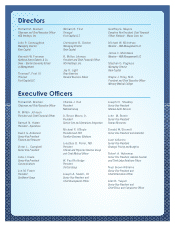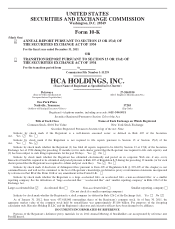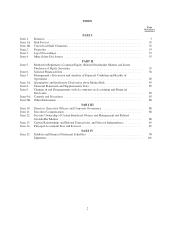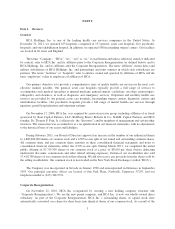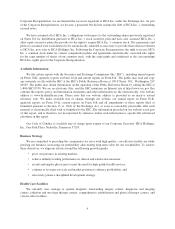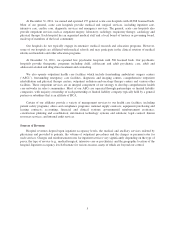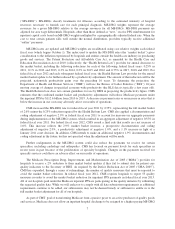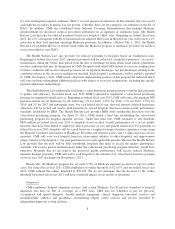HCA Holdings 2011 Annual Report Download - page 13
Download and view the complete annual report
Please find page 13 of the 2011 HCA Holdings annual report below. You can navigate through the pages in the report by either clicking on the pages listed below, or by using the keyword search tool below to find specific information within the annual report.
Psychiatric
Inpatient hospital services furnished in psychiatric hospitals and psychiatric units of general, acute care
hospitals and critical access hospitals are reimbursed under a prospective payment system (the “IPF PPS”), a per
diem payment, with adjustments to account for certain patient and facility characteristics. The IPF PPS contains
an “outlier” policy for extraordinarily costly cases and an adjustment to a facility’s base payment if it maintains a
full-service emergency department. CMS has established the IPF PPS payment rate in a manner intended to be
budget neutral and historically has used a July 1 update cycle, with each twelve month period referred to as a
“rate year.” However, CMS has issued a final rule that will transition the IPF PPS to a federal fiscal year update
cycle. Accordingly, the rates for 2012 will be effective from July 1, 2011 through September 30, 2012, with
future updates coinciding with the federal fiscal year (from October 1 through September 30). The rehabilitation,
psychiatric and long-term care (“RPL”) market basket update is used to update the IPF PPS. For rate year 2011,
CMS updated the market basket by 2.15%, representing the full market basket of 2.4% reduced by 0.25% as
required by the Health Reform Law. The Health Reform Law also provides for the following reductions to the
market basket update for payment years that begin in the following calendar years: 0.1% in 2012 and 2013, 0.3%
in 2014, 0.2% in 2015 and 2016 and 0.75% in 2017, 2018 and 2019. For rate year 2012 and each subsequent
payment year, the Health Reform Law provides for the annual market basket update to be further reduced by a
productivity adjustment. The amount of that reduction will be the projected, nationwide productivity gains over
the preceding 10 years. To determine the projection, HHS will use the BLS 10-year moving average of changes
in specified economy-wide productivity (the BLS data is typically a few years old). The Health Reform Law does
not contain guidelines for use by HHS in projecting the productivity figure. However, CMS estimates that the
combined market basket and productivity adjustments will reduce Medicare payments under the IPF PPS by
$4.3 billion from 2010 to 2019. For rate year 2012, which will span 15 months from July 1, 2011 through
September 30, 2012, CMS increased inpatient psychiatric payment rates by 2.95%, which includes a market
basket increase of 3.2% and a 0.25% reduction required by the Health Reform Law. As of December 31, 2011,
we had five psychiatric hospitals and 36 hospital psychiatric units.
Ambulatory Surgery Centers
CMS reimburses ASCs using a predetermined fee schedule. Reimbursements for ASC overhead costs are
limited to no more than the overhead costs paid to hospital outpatient departments under the Medicare hospital
outpatient PPS for the same procedure. If CMS determines that a procedure is commonly performed in a
physician’s office, the ASC reimbursement for that procedure is limited to the reimbursement allowable under
the Medicare Part B Physician Fee Schedule, with limited exceptions. All surgical procedures, other than those
that pose a significant safety risk or generally require an overnight stay, are payable as ASC procedures. From
time to time, CMS considers expanding the services that may be performed in ASCs, which may result in more
Medicare procedures that historically have been performed in hospitals being moved to ASCs, reducing surgical
volume in our hospitals. Also, more Medicare procedures that historically have been performed in ASCs may be
moved to physicians’ offices. Commercial third-party payers may adopt similar policies. For federal fiscal year
2011 and each subsequent federal fiscal year, the Health Reform Law provides for the annual market basket
update to be reduced by a productivity adjustment. The amount of that reduction will be the projected nationwide
productivity gains over the preceding 10 years. To determine the projection, HHS will use the BLS 10-year
moving average of changes in specified economy-wide productivity (the BLS data is typically a few years old).
The Health Reform Law also required HHS to submit a report to Congress on plans for developing a value-based
purchasing program for ASCs. In its report, HHS recommends a phased-in approach for implementing a value-
based purchasing program but states additional statutory authority would be required to allow performance-based
payments. CMS issued a final rule on November 1, 2011 that provides for a 1.6% annual update to ASC
payments for calendar year 2012, which includes the market basket update of 2.7% and a negative 1.1%
productivity adjustment. The final rule also establishes a quality reporting program for ASCs under which ASCs
that fail to report on five quality measures beginning on October 1, 2012 will receive a 2% reduction in
reimbursement for calendar year 2014.
10


